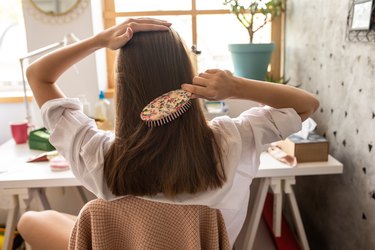
Shampoo and conditioner are mainstays for most of us when it comes to our grooming regimen. One cleans your hair and scalp while the other helps hydrate and prevent tangles. But if you're not seeing the results you want from your shampoo and conditioner, you might be wondering if you should switch things up.
It's a common misconception that hair can "get used to" a specific type of shampoo or conditioner. This myth has been circulating for quite some time, but it doesn't really hold any water (pun intended).
Video of the Day
Video of the Day
"The idea that the scalp or hair gets 'used to' or 'becomes immune to' a certain product is a myth — it's more of whether your scalp or hair has a new need from your products," Kseniya Kobets, MD, director of cosmetic dermatology at Montefiore Einstein Advanced Care in Westchester, New York, tells LIVESTRONG.com. "For example, using a sulfate-free shampoo, in addition to dry shampoos and hair-styling products, may lead to scalp buildup, and you may need clarifying shampoos or even mechanical scalp exfoliation."
Steven Line, MD, a representative of the American Cosmetic Association, agrees that your hair and scalp don't necessarily develop a tolerance or dependence on a certain shampoo or conditioner. However, he points out that you may stop seeing a benefit if and when you stop using the product.
"For example, if you use a moisturizing shampoo and conditioner, your hair may become more hydrated and less prone to dryness over time. However, if you stop using these products, your hair will return to its previous state," he tells LIVESTRONG.com.
Signs You Should Switch Your Shampoo or Conditioner
As with any product you use on your body, you might find a need to switch things up — not because it "stops working," but because the needs of your body, and in this case your hair and scalp, change.
There's no set amount of time for how often you should change your shampoo or conditioner, but it might be time for a swap if you notice any of these signs:
1. You've Noticed Differences in Your Hair or Scalp
One of the top reasons to change up your hair-care routine is if you notice changes in your scalp or hair (or both), like product buildup (from use of dry shampoo or styling products), scalp oiliness, itching, flaking, hair brittleness or split ends, Dr. Kobets says.
"Over time, as we age and also with hair processing with heat, chemicals and color, our scalp needs may change, either becoming more dry or oily, and our hair may change as well," she says. "More brittle hair may require ingredients like glycerin, panthenol or silicones."
2. The Weather Has Changed
The onset of hot weather causes more scalp sweating, which may require more frequent shampooing and the specific use of clarifying shampoo, Dr. Kobets says. And colder weather may bring on dry, itchy and sensitive scalps.
Dr. Kobets recommends using a clarifying shampoo — which removes buildup from your hair — in the warmer months and a hydrating shampoo with glycerin — which moisturizes and prevents breakage — in the colder months.
3. You Have Certain Scalp Conditions
Sometimes you may need to give your shampoo regimen a boost to include prescription products, says Beth Goldstein, MD, a dermatologist at Central Dermatology Center in Sanford, Durham and Chapel Hill, North Carolina.
Certain prescription shampoos for dandruff — like those with zinc pyrithione, salicylic acid, ketoconazole or selenium sulfide — may work for one flare-up but not another, so you may need to rotate or alternate these shampoos from time to time. Ditto for shampoos for psoriasis.
However, if the condition of your hair or scalp doesn't change and you find a shampoo that works for you, there's no need to rotate or change products.
4. You've Had Hair Treatments
It's also worth pointing out that if you change the condition of your hair by getting a perm, keratin or straightening treatment, or you undergo a chemical process, your hair and scalp needs may change.
This may require you to switch up your shampoo or conditioner to better suit the new needs of your hair, explains dermatologist Kristina Collins, MD, co-founder and CEO of Austin Skin in Austin, Texas.
"In the case of a chemical process, it may be important to choose more hydrating products that help repair or smooth the cuticle," she tells LIVESTRONG.com.
Likewise, if you've colored your hair, you may want to opt for products designed specifically for color-treated hair.
5. Your Hair Has Gotten Longer
If you're trying to grow out your hair, Dr. Collins says you may need to switch up your shampoo or conditioner as it grows longer due to the fact that the added length may make it more susceptible to product buildup.
"Longer hair may require a more clarifying routine that could help bring back more bounce," she says.
6. Your Hormones Are in Flux
When hormones fluctuate, it can cause changes to your hair and scalp, says Nadir Qazi, DO, a board-certified physician, cosmetic dermatology surgeon and founder of Qazi Cosmetic Clinic in Newport Beach, California.
If you're pregnant, postpartum or going through menopause, for example, your hair and scalp needs might change, and you might need to find a new go-to shampoo.
How to Choose the Right Shampoo and Conditioner for Your Hair
When selecting a shampoo or conditioner, it's always best to avoid certain ingredients that can cause buildup and, over time, reduce the health and structure of your hair.
Dr. Qazi recommends avoiding shampoos and conditioners that contain irritants like artificial fragrances, simple alcohols and sulfates, which can strip your hair of moisture and damage the hair cuticles. He also recommends avoiding ingredients that might cause too much buildup on the hair, like coconut oil, mineral oil, petroleum and silicone, to name a few.
If you have colored or relaxed hair, seek out shampoos and conditioners that provide ample moisture to combat brittleness and breakage and revive the strands, Dr. Goldstein says. "Conditioners with dimethicone help to coat the hair shaft, improve hydration and reduce friction, so hair can appear shinier and healthier overall," she adds.
All in all, it's a good idea to try out a shampoo or conditioner for a solid two weeks before deciding that it's not meeting your hair or scalp needs, Dr. Kobets says. This is enough time to start seeing a noticeable difference if the product is working for you.
Is this an emergency? If you are experiencing serious medical symptoms, please see the National Library of Medicine’s list of signs you need emergency medical attention or call 911.


